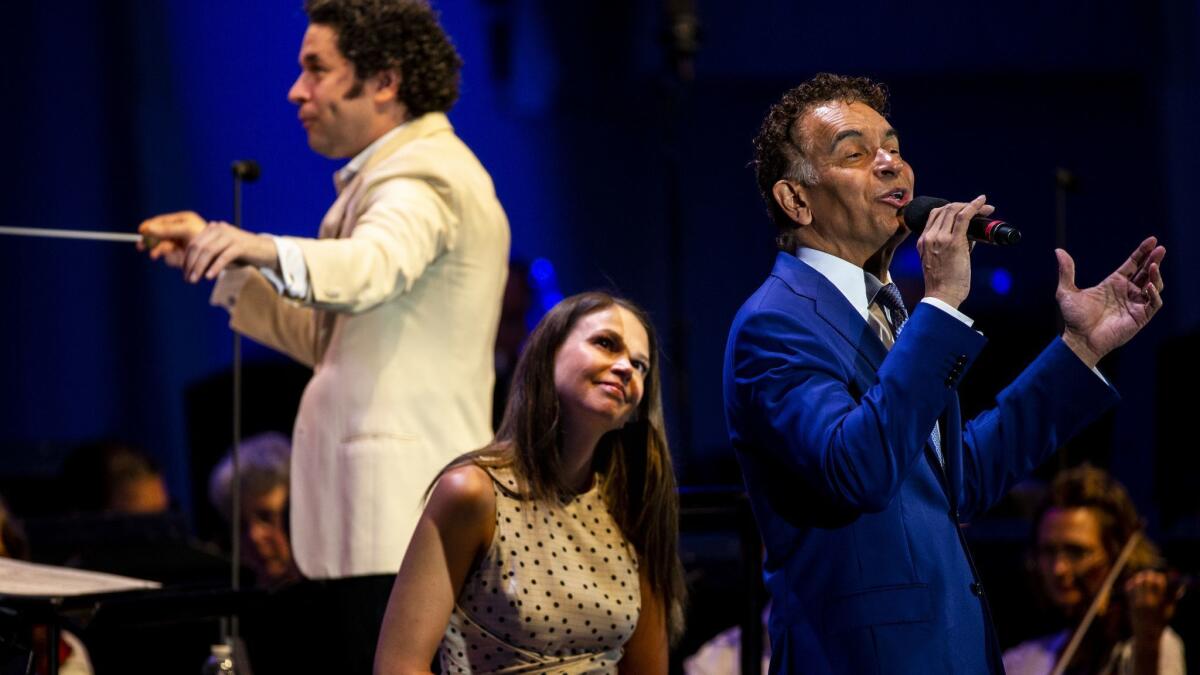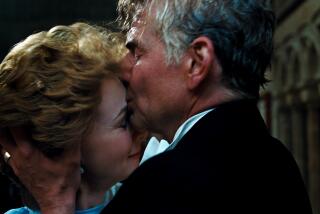Review: The Hollywood Bowl turns up the heat for Leonard Bernstein celebration — sometimes too high

There will be no escaping the heat or Lenny. Brace yourself for a Leonard Bernstein summer.
The greatest and most inspiring all-around musician this country (or arguably any country) has produced would have turned 100 Aug. 25. “Bernstein 100, the official international centenary celebration, has reached just about everywhere (“Wonderful Town” in Latvian, anyone?). Recordings, new and reissues alike, have arrived in a steady stream. New memoirs and videos are on the market.
Hollywood has been a little late to jump on the Bernstein bandwagon, but two Bernstein biopics are in the works. One will star and be directed by Bradley Cooper, the other promises a Jake Gyllenhaal Lenny. A Steven Spielberg “West Side Story” is also in the works.
The Hollywood Bowl, however, has not been late. Tuesday night, Gustavo Dudamel opened the Los Angeles Philharmonic summer concert season with an all-Bernstein program as part of L.A.’s contribution to this summer’s incomparable cornucopia of Bernsteiniana planned all across the land. This makes sense.
Dudamel — who was born in Barquisimeto, Venezuela, nine years before Bernstein died — somehow acquired a dominant strand of Bernstein’s musical DNA. In his early 20s, Dudamel came to fame in part by conducting riotous, YouTube-viral performances of the “West Side Story” mambo with his Simón Bolívar Youth Orchestra. In his nine years as music director of the L.A. Phil, Dudamel has made Bernstein’s music a constant, including brilliant performances of “Mass” and “Chichester Psalms” this past season.
Plus, Bernstein happened to be a summer kind of guy. Just check out all those glamorous poolside photos of him, young and handsome and bare-chested. Tanglewood, the Boston Symphony’s summer home in the Berkshires, was a second summer home for Bernstein. His career started there and he remained a regular ever after. His last concert was with the BSO in Tanglewood two months before he died in 1990.
Tanglewood, not unexpectedly, is devoting much of the summer to Bernstein. But it was the Bowl with the first big Bernstein summertime orchestral fete. Broadway was the emphasis. The evening promised to set the standard for all that might follow. Two summers ago, after all, Dudamel conducted a sensational “West Side Story” at the Bowl.
So what went wrong? It wasn’t Dudamel, but it was pretty much everything else.
However worth hearing, the program lacked freshness. It began and ended with the jazzy “Prelude, Fugue and Riff” and Three Meditations from “Mass.” It ended with the Symphonic Dances from “West Side Story.” In between were familiar excerpts from Bernstein’s first two Broadway hits, “On the Town” and “Wonderful Town,” featuring familiar Broadway stars Sutton Foster and Brian Stokes Mitchell.
Yet with this set of guaranteed crowd pleasers, and an impressive crowd (the amphitheater looked nearly full), the L.A. Phil, nevertheless, applied a number of hard-sell distractions. Chief among these was heavy-handed amplification.
The Bowl these days has an excellent sound system that when sensitively managed can be highly satisfying. But here the settings seemed more like what you might expect for a blockbuster action film.
Superhero Lenny had at his disposal super subwoofers booming out thumping bass. Higher pitched instruments were coated in a metallic sheen. Most of the time the volume was too loud. Solo instruments and instrumental sections were artificially highlighted.
While Dudamel seemed in his usual control, his enthusiasm high, his rhythmic finesse apparent from watching him on the video screens, the amplification prevented him from always making musical sense.
Those screens! After years of finally finding the right visual balance, they were back to being too bright and saturated with sickly color. Then again, that may have been unavoidable given the kind of garish stage lighting better suited for the priorities of weekend pops
It wasn’t, by a long shot, all awful. Yes, the orchestra’s principal clarinetist, Boris Allakhverdyan was an under-miked soloist in “Prelude, Fugue and Riffs,” which was written for Woody Hermann’s band. Yes, a young French cello soloist, Edgar Moreau, was over-miked in the “Mass” meditations, making his heavy vibrato come across as emotionally heavy-handed. Yes, the “West Side Story” dances had screwy balances.
Still the L.A. Phil can, and did, cook. And while the visually and sonically amped-up Bowl may have made the musicians too much in-your-face, the wow factor was inescapable.
Foster and Mitchell fit handily into this environment in their Broadway numbers. But how you respond to them may be a matter of taste. I’ve been taken with a new generation of Broadway singers like those in the Bowl’s “West Side Story” or ones that Michael Tilson Thomas has found for his San Francisco Symphony performances of Bernstein shows. We also have a new generation of opera singers, Julia Bullock in particular, who bring something special to Bernstein.
Foster and Mitchell choose a more commercial approach. That means they give a little extra emphasis to every word, every expressive gesture, lest you miss the impossible-to-miss point. The smile stays, no matter what. Money notes matter as much as goals in soccer.
In “On the Town,” the singers dutifully tried hard to please in a jaunty “New York, New York” duet, Foster’s chirpy “Some Other Time” and Mitchell’s sincere “Lucky to Be Me.” Both were far more wonderful in “Wonderful Town,” where Mitchell nailed the humor in “What a Waste” and Foster really was at home with “100 Ways to Please.” Audio and video captured them probably as they wanted to be captured.
Too bad, though, Foster and Mitchell were backstage during the “West Side Story” dances. Dudamel lingered exquisitely on the love music at the end. The singers returned as if to pick-up where Dudamel left off, for the “Tonight” duet as an encore. That changed the mood of tender resolve to back to Broadway over-kill.
More to Read
The biggest entertainment stories
Get our big stories about Hollywood, film, television, music, arts, culture and more right in your inbox as soon as they publish.
You may occasionally receive promotional content from the Los Angeles Times.







